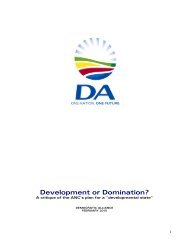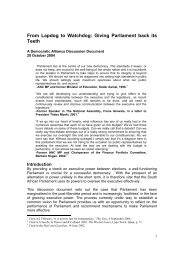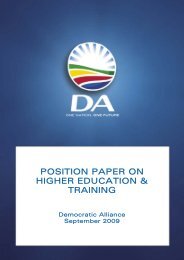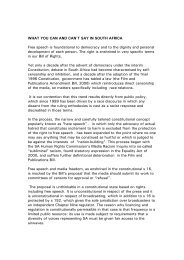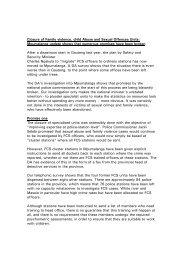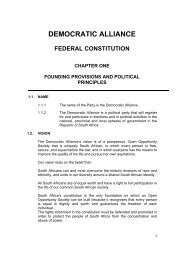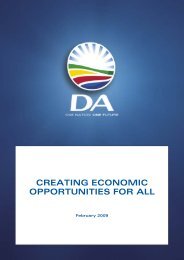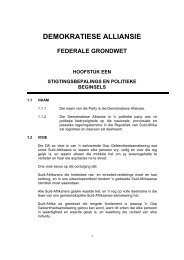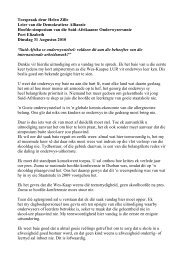DA's Plan for Growth and Jobs - Democratic Alliance
DA's Plan for Growth and Jobs - Democratic Alliance
DA's Plan for Growth and Jobs - Democratic Alliance
Create successful ePaper yourself
Turn your PDF publications into a flip-book with our unique Google optimized e-Paper software.
LONG-TERM POLICY PROPOSALSPolicy outcome: Reduce Barriers to EntryEstablish <strong>Jobs</strong> ZonesEstablish <strong>Jobs</strong> Zones in close proximity to each of South Africa’s ports <strong>and</strong> airports to attract<strong>and</strong> retain investment in key labour-absorbing industries in order to stimulate employmentcreation in these job-rich sectors. <strong>Jobs</strong> Zones will feature considerably stronger incentivesthan the national government’s current Special Economic Zones (SEZs), <strong>and</strong> will draw oninternational best practice to boost South Africa’s competitiveness vis a vis comparabledeveloping countries. Countries such as Costa Rica <strong>and</strong> Panama, <strong>for</strong> example, have offeredgenerous zone-based tax incentives to companies like Intel <strong>and</strong> Dell that do simple, largevolumerepackaging work. Their experience is that many companies that graduate from thetax holidays chose to remain invested in the country. In addition, they find that the presenceof the multinational promotes the establishment of local, related start-ups. Core aspects ofthe <strong>Jobs</strong> Zones policy include: (i) Generous exemptions from labour legislation. All investorsoperating in <strong>Jobs</strong> Zones will be exempt from restrictive aspects of South African labourlegislation in order to enhance flexibility, productivity <strong>and</strong> competitiveness with regard tolabour input costs. Amendments to the Basic Conditions of Employment Act <strong>and</strong> the LabourRelations Act will be made accordingly; (ii) Strong tax <strong>and</strong> trade incentives <strong>for</strong> investorsoperating in <strong>Jobs</strong> Zones. These will include a five year income tax holiday <strong>for</strong> all newinvestors followed by a flat tax lower than the normal rate once the holiday expires, no taxeson production inputs or capital goods, no value-added taxation, no freight taxes on thetransportation of raw, secondary or finished goods, allowing <strong>for</strong>eign-owned companies torepatriate all profits without any taxation, duty free import of machinery, goods <strong>and</strong> rawmaterials, all proceeds from exports can be retained in institutions abroad <strong>and</strong> can be spentin whatever way the exporter sees fit; (iii) Prioritise <strong>Jobs</strong> Zone investors <strong>for</strong> preferential loansthrough the Industrial Development Corporation (IDC) to fund <strong>and</strong> support industrialdevelopment projects. Applicants <strong>for</strong> preferential IDC loans will have to demonstrate the jobcreatingpotential of their project in order to be considered <strong>for</strong> such funding.Introduce an Opportunity Voucher schemeThe voucher will provide funding to young adults who would like to start their ownbusinesses or further their education <strong>and</strong> skills development. The vouchers will be allocatedaccording to strict requirements based on an assessment of the skills needed to accelerateeconomic growth. They will be available to individuals who have completed matric <strong>and</strong> willbe designed to help pay <strong>for</strong> further education, <strong>and</strong> boost the small business sector. Thevoucher would entitle the graduate (a) a partial subsidy of university or FET college fees; (b)seed capital to establish small or micro enterprises subject to a well-<strong>for</strong>med business plan;<strong>and</strong> (c) a state guarantee to cover loans extended by commercial banks to graduates toestablish small or micro enterprises subject to a coherent business plan <strong>and</strong> otherrequirements. The value of the voucher will be up to a maximum of R6000, <strong>and</strong> would varyaccording to the region where the applicant is applying. The voucher would be paid overthree years, i.e. R2000 per year. Where the voucher is utilised to pursue further education<strong>and</strong> training, funding <strong>for</strong> the second <strong>and</strong> third years will conditional on the recipient passinghis or her exams. For recipients seeking to establish small businesses, qualification <strong>for</strong>second <strong>and</strong> third year funding will be based on an assessment of the commercial viability ofthe enterprise.41 | P a g e



